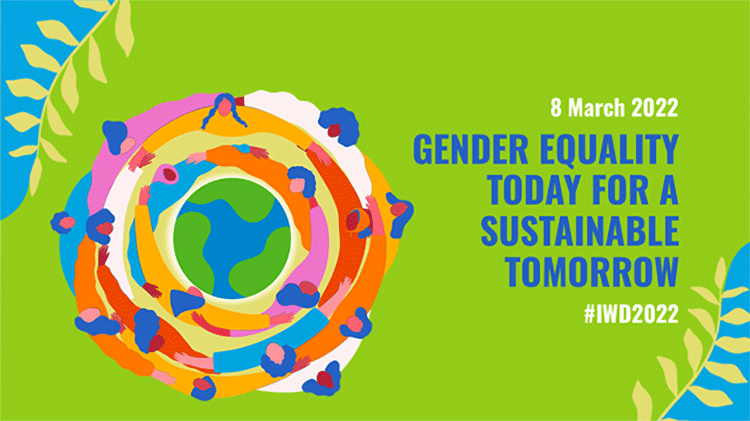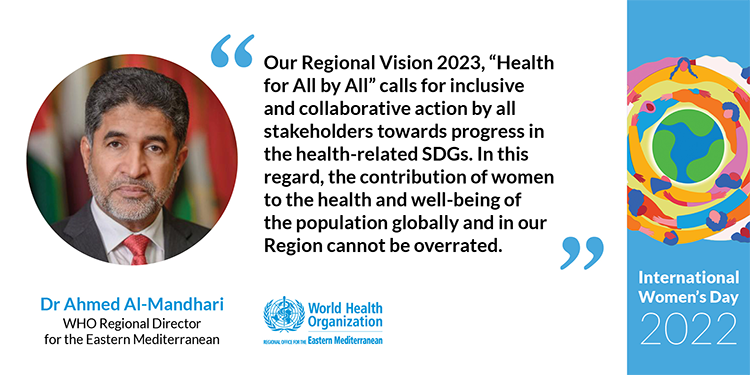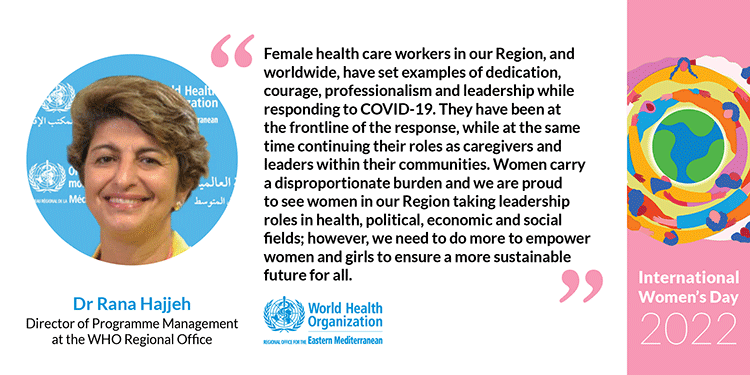
8 March, 2022 – Every year on 8 March, the world marks International Women's Day to highlight the social, economic, cultural and political achievements of women everywhere. This year’s theme ‘Gender equality today for a sustainable tomorrow’ aims to recognize the contribution of women and girls around the world, who are leading the way on climate change adaptation, mitigation and response, to build a healthier and more equal and sustainable future for all.
WHO's Regional Director for the Eastern Mediterranean, Dr Ahmed Al-Mandhari, noted the critical link between gender, climate and health and the essential contribution of women in making the 2030 Agenda for Sustainable Development a reality, especially in light of global challenges such as the COVID-19 pandemic and climate change. “Our regional Vision 2023 – Health for All by All – calls for inclusive and collaborative action by all to make progress towards the health-related Sustainable Development Goals (SDGs), and without the robust participation of women in economic, political, and public spheres, the world will fall far short of meeting its targets,” said Dr Ahmed Al-Mandhari.

Climate crisis and gender inequality are two core issues at the heart of the SDGs. And yet we witness women experiencing the greatest impact of the climate crisis, which amplifies existing gender inequalities and increases the risks they face. Women constitute the greatest proportion of the population that is reliant on natural resources threatened by the risks of climate change. Sustainability and efforts to achieve gender equality must go hand in hand – economic growth and development is critically dependent on the empowerment of women and girls.
Director of Programme Management at the WHO Regional Office, Dr Rana Hajjeh, noted the significant role played by women in protecting their communities during the COVID-19 pandemic. “Female health care workers in our Region, and worldwide, have set examples of dedication, courage, professionalism and leadership while responding to COVID-19. They have been at the frontline of the response, while at the same time continuing their roles as caregivers and leaders within their communities. Women carry a disproportionate burden and we are proud to see women in our Region taking leadership roles in health, political, economic and social fields; however, we need to do more to empower women and girls to ensure a more sustainable future for all,” Dr Hajjeh added.

As we celebrate the significant contribution of women and girls, we call on countries for collective action and shared ownership to make the International Women's Day impactful in terms of improving women’s lives, enabling women, ensuring their equal and strong engagement in decision-making for better climate-related planning, policy-making and implementation of effective measures to ensure sustainable development. It is only through reducing inequalities, including gender inequality, that we can move forward towards peace and prosperity for everyone. Empowering women and girls will ensure a better, more sustainable future and contribute to achieving the regional vision of “Health for all by all”.


